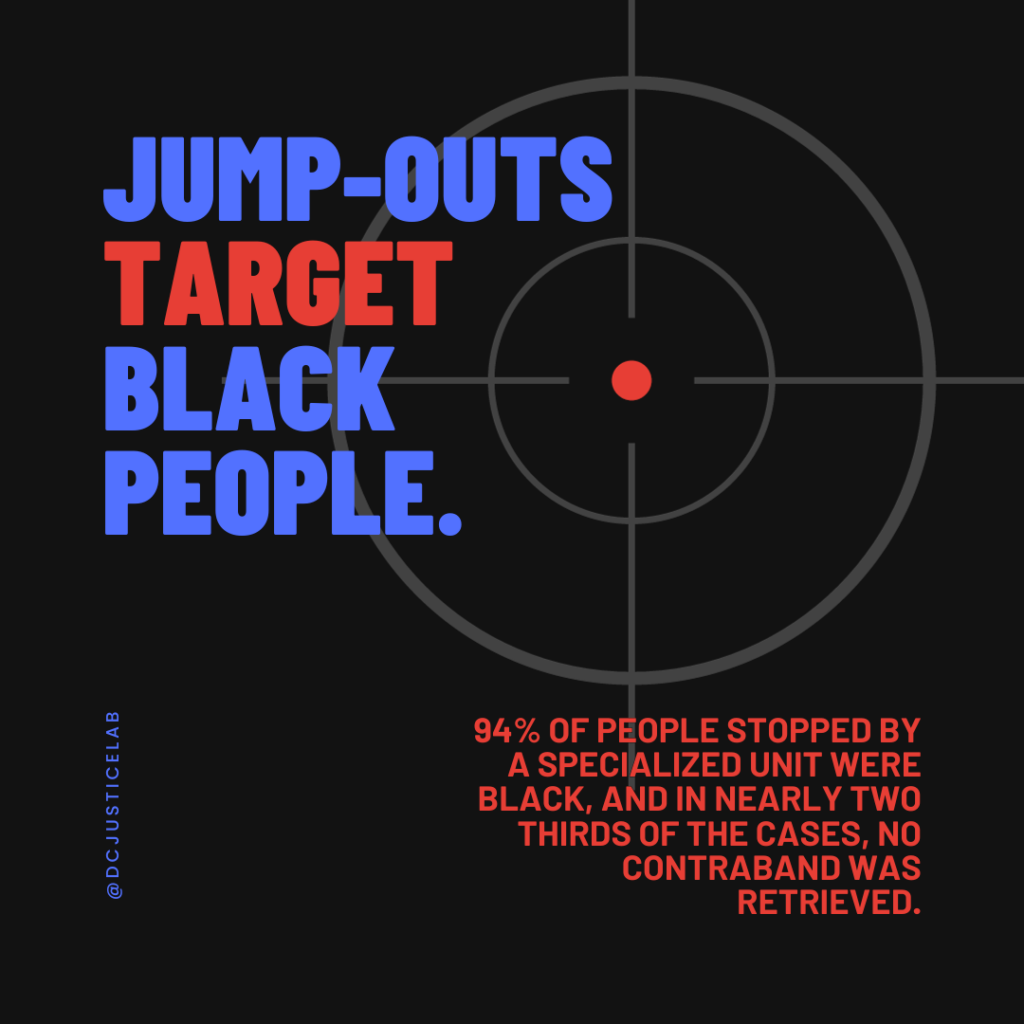Jump-outs
Jump-outs are DC’s scarier version of stop and frisk.
- 5 Minute Read
When plain-clothes officers appear quickly out of unmarked cars in the community, “jump out,” surround someone, demand that they lower their waistband and submit to a search, it decreases safety and increases the chances the encounter could escalate. Investigations show that these units and the tactics they use do not lead to more prosecutions of violent crime, but do target only Black residents. While the Metropolitan Police Department has said for a decade that they have closed “jump-out” units and banned the practice, class action lawsuits have shown that these units continued to exist under different names. Memphis, Tennessee, Louisville, Kentucky and other cities have disbanded these units and limited their search tactics. DC should end the practice of jump-outs.

What you need to know
Jump-out squads are less recognizable as police.
Most police stops occur when an officer is in uniform and a marked police car. DC has deployed officers in specialized enforcement units who are on the street in plain clothes without visible names and badge numbers and who travel in unmarked cars. These units that have existed for decades, and are conversationally known as “jump-out squads” in DC because they quickly “jump-out” at a person or group, surround them, question them, demand that they show their waistbands in search of a gun or contraband, and then pat them down. The practice has been so widely used in Black neighborhoods that people sometimes raise their shirts to show their waistband before the officers even leave their cars to avoid a jump-out.
Jump-out searches undermine constitutional safeguards.
A jump-out search undermines constitutional protections established by the 4th amendment because they occur without probable cause or reasonable suspicion required to search a civilian without a warrant or arrest. The debates about jump-out squads, and searches in DC go back to the 1980s, when officers had a documented internal culture of “warrior policing.” The Metropolitan Police Department technically banned these types of squads, but investigations and whistleblowers have said the practice continues. As part of a recent lawsuit, the former Metropolitan Police Chief said, “somebody could be jumping out right now and we may not know that,” and one retired member of the MPD reported jump-outs on more than 20 separate occasions to their supervisor and said no action was taken to curb the practice.
Jump-out squads and their tactics actually make it harder to close cases.
Stops and searches that start with a jump-out are easier to strike down in court, which means any evidence found during those encounters can’t be used by the prosecutor. This contributes to the high number of cases that are not prosecuted in DC. In 2021, the US Attorney’s Office only prosecuted 60 percent of gun cases that involved an arrest made by a specialized unit. Overall, 56 percent of arrests in DC were not prosecuted in 2023.
Jump-out squads and their tactics reduce safety.
These units and their tactics increase the likelihood of a violent police encounter because they are not clearly identifiable as police officers, so someone may be more likely to defend themselves. Jump-outs also drive a wedge between police and the community, reducing the ability for community collaboration around safety issues. Research shows these types of stop and search practices are criminogenic – they can result in a young person committing more crimes in the future –because someone experiencing a jump-out is less likely to believe any police tactic is legitimate. In describing a similar unit in Chicago, one resident told the U.S.Justice Department that these tactics in her neighborhood turned it into an “open air prison.”
Jump-out squads are supposedly being disbanded, but not necessarily in DC.
At different points in time, Memphis, Tennessee, Louisville, Kentucky, Baltimore, Maryland, and New York City, have disbanded similar units and ended jump-out tactics like “stop and frisk.” DC disbanded the units under the Narcotics and Special Investigation Division after the National Police Foundation recommended “each casual clothes unit to be easily identifiable as MPD officers when conducting jump-outs or tactical missions.” However, these types of units have been recreated under different names: after criticism of the tactics of the MPD’s Gun Recovery Unit, it was eliminated in a reorganization, with some of the staff and functions shifting over to the Violent Crime Impact Team in April, 2022. In two different rulings for civil rights abuses by MPD that were winding their way through the courts in 2023 and 2024, judges substantiated claims that jump-outs were still occurring – one involving an arrest that occurred in 2022.
Research-based alternatives to jump-outs would increase safety.
DC could move towards a model that targets a specific type of crime in a neighborhood by engaging people who are at risk of being involved in violence, providing that person with intensive services, and communicating about the law. Two dozen studies of this type of violence reduction model found most saw a significantly significant drop in violent crime. While there has been a modest increase in the equivalent of “stop and frisk” incidents under Mayor Eric Adams, New York City has cut the number of these types of searches from 600,000 to 16,000 since 2013. These reforms require follow-up and vigilance to ensure agencies do not slip back to these practices: “Stop and frisk” incidents in New York City have dramatically dropped from 600,000 to 16,000 since 2013, but more recently, Mayor Eric Adams has been unwilling to discipline officers for these types of searches.
WHERE TO LEARN MORE
The Washington City Paper June 2024
United States District Court, District of Columbia March 2023
United States District Court, District of Columbia June 2024
Washington City Paper July 2023
DC Justice Lab Report September 2020
ACLU of New York 2022
Black Lives Matter YouTube
WUSA9 February 2023
National Police Foundation September 2020
Our Solutions
- Hold an oversight hearing on the issue of “jump-out” squads and searches
- Prohibit the use of jump-out searches, including waistband searches
- Ensure all officers must work in full uniform and marked cars
- Suspend certain specialized MPD units that use aggressive stop and search tactics
special thanks
Jordan Crunkleton ★ Diontre Davis ★ Emily Friedman



